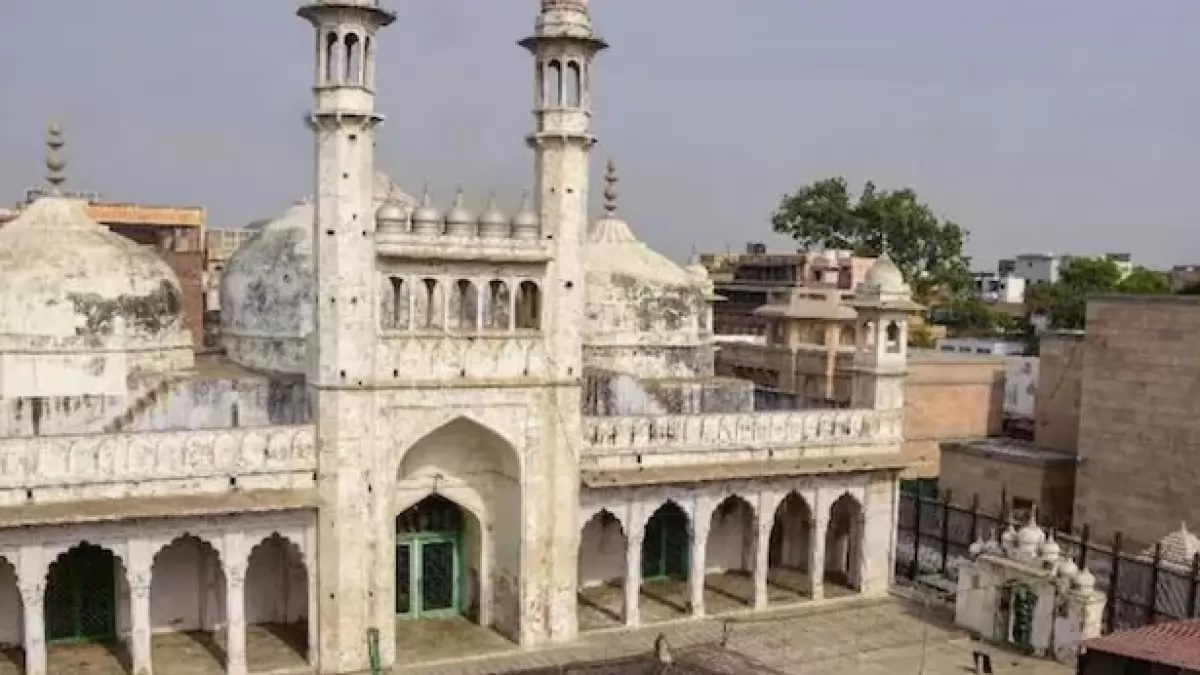
A Varanasi court, that was supposed to pronounce its order on Friday October 7, in connection with a plea to conduct carbon dating of a structure found in the Wazu Khana (ablution tank) of the Gyanvapi mosque, had deferred pronouncing its order. The next hearing will now take place on October 11.
The court deferred its order after the petitioners requested that scientific tests should be conducted to determine if carbon dating would harm the structure itself or the area around it. According to Amar Ujala, when the court enquired whether the carbon dating process would alter the location or the object, the petitioners demanded a scientific enquiry into the same.
The petitioners demanding carbon dating of the “Shivling” are – Rekha Pathak, Sita Sahu, Manju Vyas and Laxmi Devi – all plaintiffs in the wider Shringar Gauri case where they had demanded the right to resume prayers at the temple of the deity Shringar Gauri located along the wall of the mosque, claiming daily prayers had been held there till they were discontinued in 1993.
It is noteworthy that Rakhi Singh, one of the five women petitioners in the wider Shringar Gauri case, who later withdrew her name from the case, had also opposed carbon dating saying it would offend the sensibilities of Hindu devotees as it could desecrate the idol. Meanwhile, the the Anjuman Intezamia Masjid (AIM), which is the Gyanvapi mosque management authority, has also opposed the proposal to conduct carbon dating. The AIM and Rakhi Singh are also expected to present further arguments on October 11.
As SabrangIndia had reported previously, on September 12, the court of district judge Ajay Krishna Vishvesha had dismissed a plea by the AIM challenging the maintainability of the suit filed by Hindu petitioners who had demanded that they be allowed to offer prayers at the temple of deity Shringar Gauri located on the mosque premises. The court had ruled that Order 7 Rule 11 of the Code of Civil Procedure was not applicable in this case, and therefore the suit was maintainable. This is also significant because the four women petitioners had reiterated that they merely wanted a resumption of daily prayers at the Shringar Gauri temple.
Following this, the court resumed hearing the matter afresh. On September 22, four out of the five original petitioners moved a plea through their lawyer Vishnu Shakar Jain, seeking directions to conduct a carbon dating test on the structure recovered from the Wazu Khana. They claim that the structure is a “Shivling” (a symbol representing the Hindu deity Shiva and considered holy by Hindus), and therefore proof that it was part of a Hindu temple that had existed on the site prior to the construction of the mosque. Meanwhile, the mosque management committee had dismissed the structure as part of a defunct fountain. Two mahants associated with the Kashi Vishwanath temple had also debunked the “Shivling” claims.
On September 29, the court reserved its order with respect to the carbon dating matter and is expected to deliver its verdict on October 7.
Meanwhile, it must be reiterated that this is not the first time a plea has been made for scientific investigation of the “shivling”. In July this year, seven Hindu women including an advocate, a professor and five social workers, all represented by advocate Vishnu Jain had moved Supreme Court demanding carbon dating of the structure discovered during the video survey. The petitioners had also demanded a Ground Penetrating Radar (GPR) survey of the area. Further, they sought directions from the Supreme Court to the Kashi Vishwanath Temple Trust to take over the “Shivling” and the adjacent area, claiming that the deity had dominion over five kos or 15 kilometers of peripheral land.
But on July 21, a bench comprising Justices DY Chandrachud, Surya Kant and PS Narasimha refused to entertain the petition, which was subsequently withdrawn with liberty to pursue suitable legal recourse.
Related:
Gyanvapi case: Rift widens between Shringar Gauri plaintiffs
Gyanvapi case: Petitioner moves caveat before Allahabad High Court
Gyanvapi case: Court dismisses mosque committee’s plea challenging maintainability of suit
Gyanvapi case: Plea before SC for carbon dating of “Shivling”